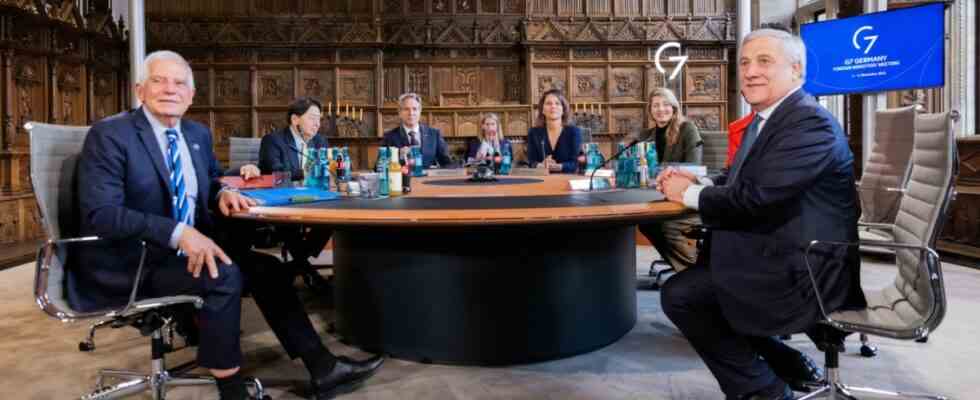Representatives of the major religions have sharply criticized the fact that a prominent cross was removed from a pedestal for the meeting of the G-7 foreign ministers in Münster’s Friedenssaal. Foreign Minister Annalena Baerbock regretted this measure, saying it was purely organizational and not political.
“We have been working here for two days to ensure peace in the world and I found out about this decision this morning when I was standing in the room with the mayor,” said Baerbock at the closing press conference. Other temporary changes were also made in the Hall of Peace, such as installing conference technology and rearranging the furniture. As part of this, the cross was taken down, but this was not a conscious or political decision. “I’m very sorry,” said Baerbock. “The cross is part of the history of this place. I would have liked it if we hadn’t put it away.”
There is actually a large cross in the hall, it dates from 1540.
(Photo: Guido Kirchner/dpa)
“The cross was removed at the request of employees of the Federal Foreign Office for the time of the foreign ministers’ meeting,” said Markus Lewe (CDU), Mayor of Münster. According to the city of Münster, employees of the foreign office asked for the cross to be removed because people with different religious backgrounds were taking part in the G-7 meeting. Lewe also said that the Foreign Minister was surprised. “The cross has been part of the Hall of Peace for centuries and thus part of the history and culture of the conference venue. The Christian cross is a sign of reconciliation,” says Lewe.
“Completely incomprehensible”
The chairwoman of the council of the Evangelical Church in Germany (EKD), Annette Kurschus, called the step “completely incomprehensible, even verging on the grotesque”. Christian denominations would have devastated Europe in the Thirty Years’ War. “The religious war was ended under this cross in the Friedenssaal in Münster and Europe was pacified with it,” says the theologian, who is also president of the Westphalian state church. The diocese of Münster also called the measure “incomprehensible” and announced that it intended to complain about the Catholic Office in Berlin, the Catholic Church’s contact point with the federal government.
The chairman of the Central Council of Muslims, Aiman Mazyek, also expressed a lack of understanding. The reference to the Peace of Westphalia also goes hand in hand with dealing with Christianity and above all with the Church and Enlightenment of that time. “Bearing in mind that, the conclusion then cannot be the removal of the cross, allegedly because of the feelings of others,” Mazyek said.
According to the city of Münster, the so-called council cross in the historical peace hall of the town hall dates back to 1540 and is therefore more than 100 years older than the Peace of Westphalia concluded in 1648 in the peace hall. To this day, all new members of the Münster city council are usually sworn in in front of the council cross. The cross was not removed during a visit by Grand Imam Ahmad al-Tayyeb from Cairo in 2016, nor during a visit by the Dalai Lama in 2007.

